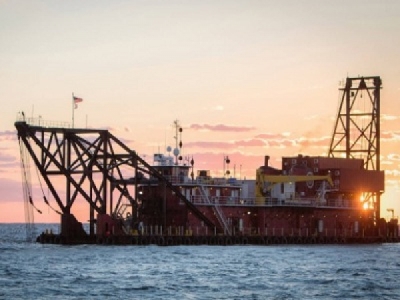
Posted on February 20, 2018
By DeAnn Komanecky, savannahnow
After a disappointing week of budget announcements, Savannah’s harbor expansion project may be moving closer to receiving the funds needed to finish the project.
On Monday, President Trump’s budget proposal included about half of what is needed for fiscal year 2019. But the situation started looking a bit better by mid-week.
The Georgia congressional delegation in a joint statement said Monday night that President Trump’s budget “shortchanges” the Savannah Harbor Expansion Project.
U.S. Senators Johnny Isakson, R-Ga., and David Perdue, R-Ga., and U.S. Representative Buddy Carter, R-Ga.-01, made the comments in response to only $49 million being included in the president’s budget request for fiscal year 2019. That amount is about half of what is needed yearly to keep the project on track for time and cost efficiency.
“I appreciate that the Trump administration has committed to emphasize investments in ongoing construction of projects with high economic returns,” said Carter. “With a return on investment of 7.3 to 1, SHEP should absolutely be at the top of the list. With increased infrastructure spending available, the federal government must meet its obligation to fund this project, just as the state of Georgia has already done. I hope President Trump and Vice President Pence will come to the Port of Savannah to see the benefits this top infrastructure project will have on the nation firsthand.”
Trump also released on Monday a $1.5 trillion infrastructure package. The package outlines Trump’s proposed plans for funding infrastructure projects and changes in regulations.
During a senate budget committee hearing Tuesday evening, Perdue asked Office of Management and Budget Director Mick Mulvaney about how projects with a high rate of investment return — like SHEP — are prioritized for funding.
“I specifically call out an issue that I believe is caught between current authorizations and future infrastructure investments. In states like Texas, Louisiana, Florida, Georgia, South Carolina, Virginia, New Jersey, these ports are trying to accommodate the new Panamax ships that would dramatically improve our ability to compete around the world,” Perdue said. “I believe those investments are caught up in the Army Corps of Engineers budget being cut but are not being moved over to the infrastructure investments. These port investments actually offer a higher rate of return than some of the infrastructure investments I think we’ve contemplated. Can you address that?”
Mulvaney’s answer was “comforting,” Perdue said.
“At the risk of making a small correction, we absolutely anticipate that the deep water ports will be part of the infrastructure bill,” Mulvaney said. “In fact, the largest part of the infrastructure bill, 50 percent of the $200 billion, $100 billion, is in our mind set aside for programs that can contribute their own portion from the funding. As you know, the port of Savannah is exactly that. We specifically had the deep-water ports in mind when we fashioned the infrastructure bill.”
‘Rounded first base’
Those words were also encouraging for Griff Lynch, said executive director of the Georgia Ports Authority.
“Everyone is recognizing the benefit of this project to not just Georgia, but the nation,” Lynch said.
Lynch said Georgia’s team of legislators is working hard to acquire the federal funding for the project.
“Perdue is intimately familiar with the project as is Isakson,” Lynch said.
Lynch said it was also good news that Savannah was budgeted for more dollars in Trump’s budget than any other port deepening project.
“We’ve rounded first base,” Lynch said. “We aren’t there yet, but we will keep driving.”
A U.S. Army Corps of Engineers economic impact study found the Savannah Harbor deepening will return $7.30 for every dollar spent on construction. The Corps estimates the net benefit of transportation savings for shippers and consumers at $282 million per year. The expected total savings to the nation over the course of 50 years is $14.1 billion.
“The Savannah Harbor Expansion Project is one of the most important infrastructure projects in the country with the largest return on investment of any project the Army Corps of Engineers is currently managing,” said Perdue. “It is the fastest growing port in the country.”
“If this project encounters further delays, its cost only increases while the benefits slip further into the future,” Isakson said. “We will not stop working to ensure that the federal government meets its commitments to this top infrastructure project, including in the omnibus funding bill expected next month.”
The federal commitment for the project is to pay 75 percent of the $973 million project cost. The state of Georgia has already contributed about $266 million for the project and the 2019 budget includes $35 million more.
The U.S. Army Corps of Engineers has said the project needs about $100 million per year for a construction period of five years. If the project is only funded at $50 million per year it would add five years to the project with a cost increase of $56 million due to inflation.
SHEP will deepen the harbor from its current 42 feet to 47 feet and allow large ships that are now coming through the Panama Canal. Some of these neo-Panamax ships are coming to Savannah already, but they are not loaded to capacity.
The deep draft navigation project is slated to be complete in 2021. Currently dredging of the outer harbor is nearing completion. The outer harbor dredging has to be completed before dredging of the inner harbor can begin.
Source: savannahnow





